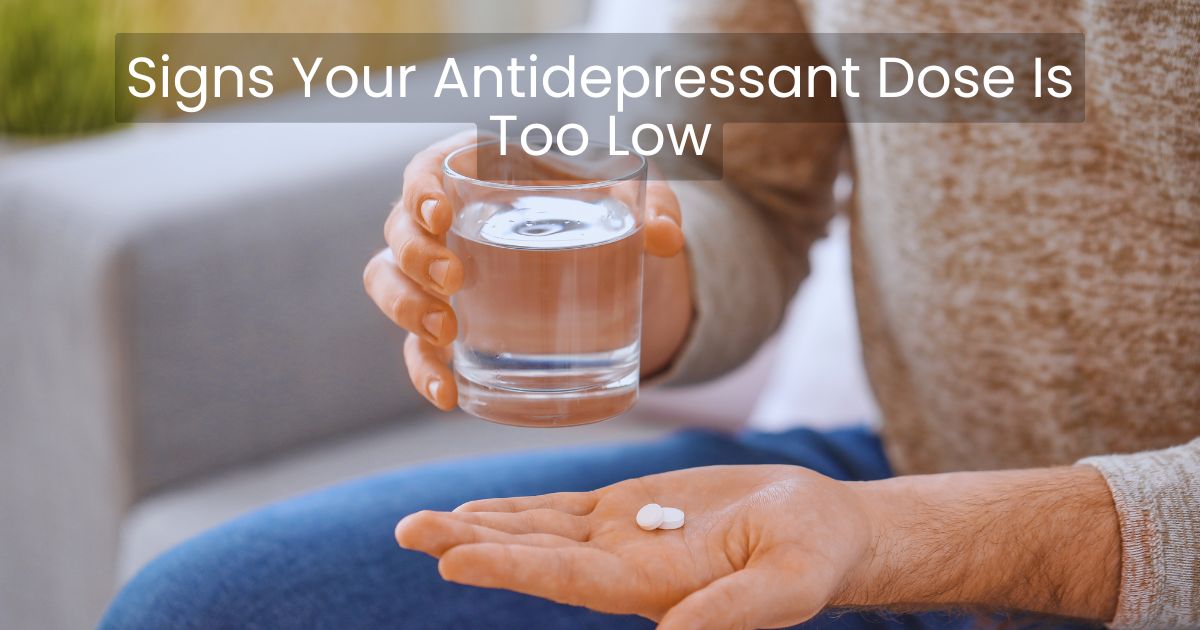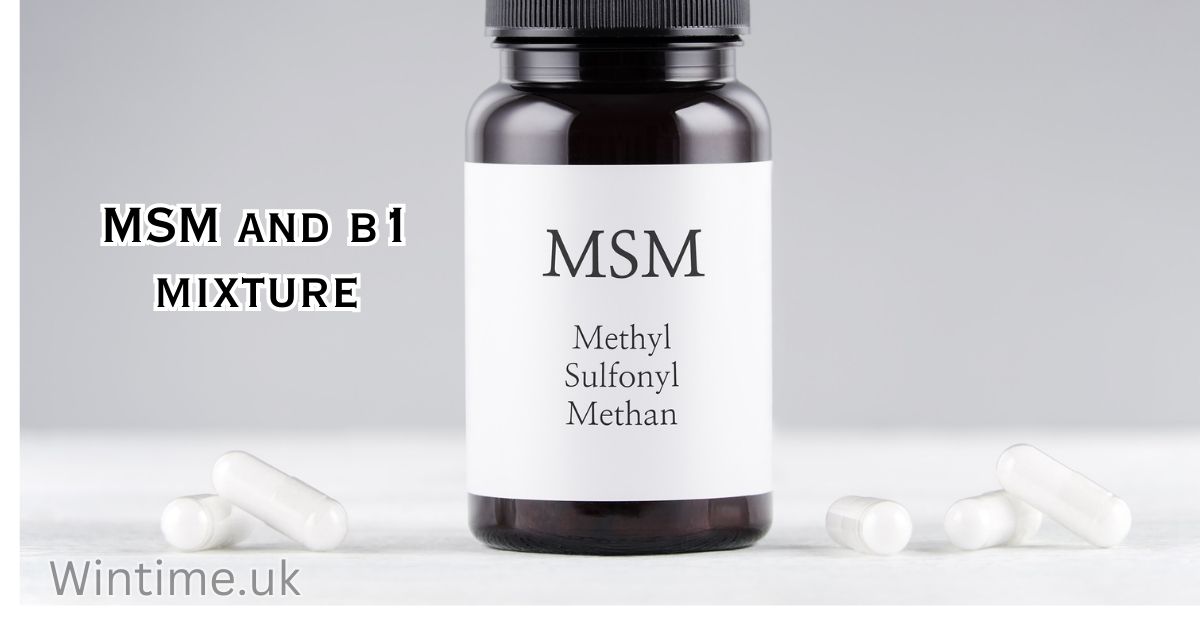Antidepressants are widely prescribed medications designed to alleviate symptoms of depression and anxiety. They work by balancing chemicals in the brain, primarily neurotransmitters like serotonin, dopamine, and norepinephrine, which influence mood and emotional well-being. However, finding the right dosage of antidepressants can be challenging, as too low of a dose may not effectively manage the symptoms. Understanding the signs your antidepressant dose is too low is crucial for ensuring that you receive the full benefits of the medication.
The journey to finding the correct antidepressant dose is often a process of trial and error. Your healthcare provider may start you on a lower dose to minimize potential side effects, gradually increasing it as your body adjusts. However, this approach sometimes results in an insufficient dose, leaving you with unresolved symptoms. This article will explore the key signs indicating that your antidepressant dose may be too low and why it’s essential to address this issue promptly.
Identifying these signs early can prevent the negative effects of undertreated depression, allowing you to work closely with your healthcare provider to adjust your medication and improve your quality of life. Whether you’re newly prescribed antidepressants or have been on them for some time, this guide will provide valuable insights into recognizing when your dose might need adjustment.
Understanding Antidepressant Dosage
Determining the right dosage of antidepressants is a complex process that involves various factors, including your age, weight, metabolism, and the specific type of antidepressant prescribed. Each individual responds differently to medication, so what works for one person may not necessarily work for another. Healthcare providers typically start with a low dose and monitor the patient’s response before making any adjustments. This careful approach helps in minimizing side effects and gauging the medication’s effectiveness.
Factors influencing dosage needs include the severity of depression, co-existing mental health conditions, and how long the symptoms have persisted. For example, someone with severe, chronic depression may require a higher dose compared to someone experiencing mild, situational depression. Additionally, certain medications require more time to build up in the system, meaning initial doses might be lower to allow the body to adapt gradually.
Dosage adjustments are often necessary as your body and brain chemistry change over time. Your healthcare provider will monitor your symptoms and side effects, making incremental adjustments to ensure the medication is as effective as possible. However, if your dose remains too low for an extended period, it can result in persistent symptoms, leading to a reduced quality of life. Recognizing the signs that your dose might be too low is the first step toward getting the help you need.
General Symptoms of Low Antidepressant Dose
One of the most common signs your antidepressant dose is too low is a persistent low mood. If you find that your feelings of sadness, hopelessness, or emptiness persist despite taking your medication, this could indicate that the dose is insufficient. While antidepressants are not a quick fix, they should gradually alleviate these symptoms over time. If this doesn’t happen, it’s a clear signal that your dose might need to be reevaluated.
Another key indicator is a lack of improvement in daily functioning. Depression often affects various aspects of life, including work, relationships, and daily activities. If you continue to struggle with basic tasks, find it hard to stay motivated, or feel overwhelmed by responsibilities, your current dose may not be adequate. Medication should help you regain some level of normalcy in your daily routine, so ongoing difficulties could be a red flag.
Ongoing fatigue and lack of energy are also common symptoms of a low antidepressant dose. While depression itself often causes fatigue, your medication should help reduce this symptom. If you’re still feeling exhausted, even after getting enough rest, and you find it difficult to muster the energy to get through the day, it could be a sign that your antidepressant dose is not sufficient. Addressing this issue with your healthcare provider can help you find the right balance to improve your overall energy levels.
Psychological Signs Your Antidepressant Dose Is Too Low
Psychological symptoms are often the most telling indicators that your antidepressant dose is too low. Continued anxiety and excessive worry are major red flags. While some anxiety can be a part of depression, your medication should help reduce these feelings over time. If you’re still experiencing frequent anxiety attacks, constant worry, or feelings of dread, it might indicate that your dose isn’t high enough to manage these symptoms effectively.
Persistent feelings of hopelessness are another psychological sign that your antidepressant dose may be too low. Even though antidepressants don’t necessarily create a feeling of euphoria, they should help alleviate the overwhelming sense of despair that often accompanies depression. If you continue to feel hopeless about the future or struggle to see any positive aspects in life, it’s essential to discuss this with your healthcare provider. An adjustment in dosage might be necessary to improve these feelings.
Ongoing irritability and restlessness are also common indicators that your antidepressant dose may need to be increased. While some level of irritability can be a side effect of the medication, especially in the initial stages, persistent irritability or agitation suggests that the dose might be too low. Restlessness, including an inability to relax or feeling constantly on edge, can significantly impact your quality of life and is a strong sign that your current dose isn’t adequately addressing your symptoms.
Physical Signs Your Antidepressant Dose Is Too Low
Physical symptoms can also reveal that your antidepressant dose is too low. Sleep disturbances are one of the most common physical signs. If you’re experiencing insomnia, waking up frequently during the night, or oversleeping, your medication might not be at the right level. While antidepressants often take time to regulate sleep patterns, persistent issues in this area suggest that your dose may not be sufficient.
Changes in appetite and weight are another physical indicator that your antidepressant dose might be too low. Depression often affects appetite, leading to weight gain or loss. Your medication should help stabilize these changes over time. However, if you continue to experience significant fluctuations in appetite or weight, it might indicate that your dose isn’t high enough to manage these symptoms effectively.
Persistent aches and pains without a clear medical cause can also be a sign of an insufficient antidepressant dose. Depression is known to cause physical discomfort, including headaches, back pain, and muscle aches. If these symptoms persist even after starting medication, it could mean that your dose needs to be adjusted. Addressing these physical symptoms with your healthcare provider can help you find the right balance and improve your overall well-being.
Behavioral Indicators of Low Antidepressant Dose
Behavioral changes are another key area where signs of a low antidepressant dose may manifest. Social withdrawal and isolation are common indicators. If you find yourself avoiding social interactions, canceling plans, or feeling uncomfortable in social settings even after starting your medication, it could mean your dose is too low. Antidepressants should help reduce these feelings of isolation and encourage more social engagement.
Decreased interest in activities once enjoyed is another behavioral sign. Depression often robs individuals of the pleasure they once found in hobbies, work, or social activities. If your antidepressant dose is sufficient, you should gradually regain interest in these activities. However, if you still find little to no enjoyment in things you once loved, it might indicate that your medication dose is not adequate.
Trouble concentrating or making decisions is also a common behavioral symptom of a low antidepressant dose. Depression can cause a mental fog, making it difficult to focus or make decisions. While antidepressants should help clear this fog, ongoing difficulties in concentration or decision-making suggest that your dose may need to be increased. Addressing these issues can help improve your cognitive function and overall quality of life.
Emotional Signs Your Antidepressant Dose Is Too Low
Emotional numbness or a flat affect is a significant emotional sign that your antidepressant dose may be too low. While antidepressants are meant to help balance emotions, they should not leave you feeling emotionally numb or disconnected. If you find that you’re not experiencing emotions as intensely as you should, or if you feel indifferent to things that would normally elicit a reaction, it could be a sign that your dose needs to be adjusted.
Uncontrolled mood swings are another emotional indicator. While mood swings can be a part of depression, your medication should help stabilize your mood over time. If you’re still experiencing frequent, intense changes in mood—ranging from irritability to sadness, to anger—it might suggest that your dose is too low. Adjusting your medication under the guidance of your healthcare provider can help achieve a more balanced emotional state.
Persistent feelings of guilt or worthlessness are also key emotional signs that your antidepressant dose may be insufficient. These feelings are common in depression but should begin to diminish as your treatment progresses. If you continue to struggle with overwhelming guilt or a sense of worthlessness, it’s important to discuss this with your doctor. These emotions can be debilitating, and adjusting your dose might be necessary to alleviate them and improve your mental health.
Signs Your Antidepressant Dose Is Too Low in Daily Life
The impact of a low antidepressant dose can be especially noticeable in daily life. Struggling with work or school performance is a major sign. If you find it difficult to concentrate, meet deadlines, or stay motivated at work or school despite being on medication, it could mean that your dose isn’t high enough. Antidepressants should help improve focus and productivity, so ongoing struggles in these areas warrant a discussion with your healthcare provider.
Increased relationship conflicts are another daily life indicator. Depression can strain relationships, but your medication should help you manage your emotions and improve communication. If you’re still experiencing frequent arguments, misunderstandings, or emotional distance from loved ones, it could suggest that your dose is too low. These conflicts can add to your stress and negatively impact your recovery, making it crucial to address this issue.
Difficulty managing daily responsibilities, such as household chores, finances, or personal care, is also a sign that your antidepressant dose may be insufficient. Depression can make even the simplest tasks feel overwhelming, but your medication should help ease this burden over time. If you continue to struggle with daily responsibilities, it could mean that your dose needs to be increased to provide better symptom management and improve your quality of life.
Also Read: How Many Yards of Concrete in a Truck
The Role of Tolerance and Adaptation
Over time, your body can develop a tolerance to antidepressants, meaning that the dose that was once effective may no longer work as well. This is a natural process, as your body and brain chemistry adapt to the medication. However, this tolerance can lead to a gradual return of symptoms, even if you’ve been on the same dose for a while. Recognizing this is important, as it may necessitate a dosage increase or a switch to a different medication.
Tolerance can manifest in various ways, including the return of depressive symptoms, increased anxiety, or a decline in overall mood and functioning. It’s essential to monitor these changes and communicate them to your healthcare provider. They may recommend an adjustment in your medication to counteract the effects of tolerance and restore the medication’s effectiveness.
Adaptation to antidepressants is a common occurrence, but it should not be ignored. If you notice that your symptoms are gradually returning or that the medication isn’t working as well as it used to, it’s important to seek help. Adjusting your dose or exploring other treatment options can help ensure that you continue to receive the benefits of your medication and maintain your mental health.
Risks of Remaining on a Low Dose
Remaining on a low antidepressant dose for an extended period can have serious consequences. One of the most significant risks is the potential for your symptoms to worsen. Depression is a progressive condition, and if left untreated or undertreated, it can lead to more severe symptoms, including suicidal thoughts or actions. Ensuring that your dose is sufficient to manage your symptoms is crucial for preventing these negative outcomes.
Another risk of staying on a low dose is the impact on your overall quality of life. Depression affects every aspect of life, from work and relationships to physical health and daily functioning. If your medication dose is too low, you may continue to struggle with these areas, leading to a diminished quality of life. This can create a cycle of frustration and hopelessness, making it harder to recover.
Undertreated depression can also have long-term effects on your physical health. Chronic depression is linked to various health issues, including heart disease, diabetes, and a weakened immune system. By addressing the issue of a low antidepressant dose, you can reduce these risks and improve your overall well-being. Working closely with your healthcare provider to find the right dose is essential for achieving the best possible outcomes.
How to Address the Issue of a Low Dose
If you suspect that your antidepressant dose is too low, the first step is to consult with your healthcare provider. It’s important to communicate your symptoms clearly and provide as much detail as possible about how you’re feeling. Your doctor may recommend increasing your dose, switching to a different medication, or adding an adjunct therapy to enhance the effectiveness of your treatment.
In some cases, your doctor may suggest a gradual increase in dosage to minimize side effects. This approach allows your body to adjust to the higher dose while monitoring your symptoms for improvement. It’s important to follow your doctor’s instructions carefully and attend all follow-up appointments to ensure that the adjustments are working effectively.
In addition to medication adjustments, your healthcare provider may recommend complementary therapies such as cognitive-behavioral therapy (CBT), lifestyle changes, or dietary modifications. These approaches can enhance the effectiveness of your antidepressant and help you manage your symptoms more effectively. Addressing the issue of a low dose is a collaborative process that requires open communication and a willingness to explore different treatment options.
Working with Your Healthcare Provider
Working closely with your healthcare provider is crucial in managing your antidepressant dosage. Open and honest communication is the foundation of this relationship. Be sure to share any changes in your symptoms, side effects, or concerns you may have about your medication. Your healthcare provider is there to support you and make adjustments as needed to ensure that your treatment is effective.
It’s also important to follow your healthcare provider’s recommendations carefully. This includes taking your medication as prescribed, attending all follow-up appointments, and making any necessary lifestyle changes. Adherence to your treatment plan is key to achieving the best possible outcomes and maintaining your mental health.
If you feel that your dose is too low, don’t hesitate to bring it up with your healthcare provider. They can work with you to find the right balance and make any necessary adjustments to your treatment plan. Remember, finding the correct dose is often a process, and it’s okay to advocate for yourself and your needs during this journey.
Monitoring and Regular Check-ins
Regular monitoring and check-ins with your healthcare provider are essential for managing your antidepressant dosage. These appointments allow your doctor to assess how well your medication is working, make any necessary adjustments, and address any concerns you may have. Regular check-ins also provide an opportunity to discuss any new symptoms or side effects that may have arisen since your last visit.
Monitoring your symptoms between appointments is also important. Keeping a journal or using a symptom-tracking app can help you document how you’re feeling on a day-to-day basis. This information can be invaluable during your check-ins with your healthcare provider, as it provides a detailed account of your progress and any challenges you’re facing.
Don’t underestimate the importance of these regular check-ins. They are a crucial part of managing your depression and ensuring that your medication is working effectively. By staying engaged in your treatment plan and maintaining open communication with your healthcare provider, you can achieve better outcomes and improve your overall quality of life.
The Importance of Patience and Persistence
Finding the right antidepressant dose requires patience and persistence. It’s not uncommon for it to take several weeks or even months to find the correct dosage. During this time, it’s important to remain patient and trust the process. Remember, your healthcare provider is there to support you and will make adjustments as needed to ensure that your treatment is effective.
It’s also important to be persistent in your treatment. Don’t give up if you don’t see immediate results. Antidepressants often take time to work, and it may require several adjustments to find the right dose. Staying committed to your treatment plan and maintaining regular communication with your healthcare provider will help you navigate this journey successfully.
Patience and persistence are key to managing your depression and finding the right medication dose. By staying engaged in your treatment and working closely with your healthcare provider, you can achieve the best possible outcomes and improve your overall well-being.
Addressing Side Effects While Adjusting Dosage
Adjusting your antidepressant dose can sometimes result in side effects. It’s important to be aware of these potential side effects and address them promptly with your healthcare provider. Common side effects of dose adjustments may include nausea, dizziness, fatigue, and changes in appetite or sleep patterns. While these side effects are usually temporary, they can be uncomfortable and may require management strategies.
Your healthcare provider can offer guidance on how to manage side effects, such as taking your medication with food to reduce nausea or adjusting the timing of your dose to minimize sleep disturbances. In some cases, your doctor may recommend a slower increase in dosage to allow your body more time to adjust. It’s important to communicate any side effects you experience so that your treatment plan can be tailored to your needs.
Remember, side effects are a common part of the process of finding the right dose. By working closely with your healthcare provider and addressing any side effects as they arise, you can minimize discomfort and ensure that your treatment remains effective.
Potential Long-term Solutions
In some cases, finding the right antidepressant dose may involve long-term solutions. This could include combining medications, adding psychotherapy, or incorporating lifestyle changes such as exercise and diet modifications. These approaches can enhance the effectiveness of your antidepressant and provide more comprehensive management of your symptoms.
Combination therapy, where two or more medications are used together, can be particularly effective for individuals who do not respond adequately to a single medication. Your healthcare provider may also recommend adjunct therapies, such as cognitive-behavioral therapy (CBT), to address underlying issues that may be contributing to your depression.
Long-term solutions require a collaborative approach between you and your healthcare provider. By exploring different options and being open to trying new strategies, you can find a treatment plan that works for you and provides lasting relief from your symptoms.
Alternative Treatments and Supplements
In addition to traditional antidepressants, there are alternative treatments and supplements that may help manage depression. These options can be used in conjunction with your current medication or as part of a broader treatment plan. Common supplements that have been shown to help with depression include omega-3 fatty acids, St. John’s wort, and SAMe (S-adenosylmethionine).
It’s important to consult with your healthcare provider before adding any supplements to your regimen, as they can interact with your current medication or have side effects. In some cases, alternative treatments such as acupuncture, yoga, or meditation may also be recommended to complement your antidepressant treatment and improve your overall well-being.
Exploring alternative treatments and supplements can provide additional support in managing your depression. By working with your healthcare provider to integrate these options into your treatment plan, you can create a more holistic approach to managing your symptoms.
When to Consider a Different Antidepressant
In some cases, adjusting the dose of your current antidepressant may not be enough to manage your symptoms. If you’ve tried increasing your dose and still don’t see improvement, it may be time to consider a different antidepressant. There are many different types of antidepressants available, and what works for one person may not work for another.
Your healthcare provider can help you explore other medication options and find one that is more effective for you. This process may involve some trial and error, but it’s important to keep an open mind and be patient. Finding the right medication can make a significant difference in managing your depression and improving your quality of life.
Switching to a different antidepressant may feel daunting, but it can be a crucial step in finding the right treatment for you. By working closely with your healthcare provider and being willing to explore different options, you can find the best approach to managing your depression.
Conclusion
Managing depression is a complex process that often requires adjustments to your treatment plan, including recognizing the signs your antidepressant dose is too low. It’s important to stay engaged in your treatment, communicate openly with your healthcare provider, and be patient as you work together to find the right dose. By taking an active role in your treatment, you can better manage your symptoms and improve your overall quality of life.
Remember, depression is a treatable condition, and finding the right dose of antidepressants is a key part of your recovery journey. With the right support and treatment plan, you can take control of your mental health and work towards a brighter, healthier future.










